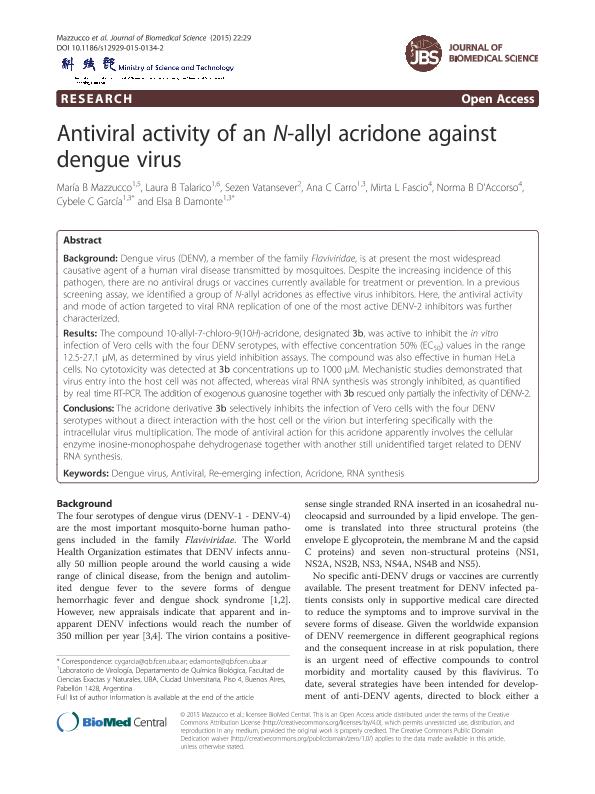Artículo
Antiviral activity of an N-allyl acridone against dengue virus
Mazzucco, María Belén ; Talarico, Laura Beatriz
; Talarico, Laura Beatriz ; Vatansever, Sezen; Carro, Ana Clara
; Vatansever, Sezen; Carro, Ana Clara ; Fascio, Mirta Liliana; D'Accorso, Norma Beatriz
; Fascio, Mirta Liliana; D'Accorso, Norma Beatriz ; Garcia, Cybele
; Garcia, Cybele ; Damonte, Elsa Beatriz
; Damonte, Elsa Beatriz
 ; Talarico, Laura Beatriz
; Talarico, Laura Beatriz ; Vatansever, Sezen; Carro, Ana Clara
; Vatansever, Sezen; Carro, Ana Clara ; Fascio, Mirta Liliana; D'Accorso, Norma Beatriz
; Fascio, Mirta Liliana; D'Accorso, Norma Beatriz ; Garcia, Cybele
; Garcia, Cybele ; Damonte, Elsa Beatriz
; Damonte, Elsa Beatriz
Fecha de publicación:
05/2015
Editorial:
Biomed Central
Revista:
Journal Of Biomedical Science
ISSN:
1021-7770
Idioma:
Inglés
Tipo de recurso:
Artículo publicado
Clasificación temática:
Resumen
Dengue virus (DENV), a member of the family Flaviviridae, is at present the most widespread causative agent of a human viral disease transmitted by mosquitoes. Despite the increasing incidence of this pathogen, there are no antiviral drugs or vaccines currently available for treatment or prevention. In a previous screening assay, we identified a group of N-allyl acridones as effective virus inhibitors. Here, the antiviral activity and mode of action targeted to viral RNA replication of one of the most active DENV-2 inhibitors was further characterized.Results: The compound 10-allyl-7-chloro-9(10H)-acridone, designated 3b, was active to inhibit the in vitro infection of Vero cells with the four DENV serotypes, with effective concentration 50% (EC50) values in the range 12.5-27.1 μM, as determined by virus yield inhibition assays. The compound was also effective in human HeLa cells. No cytotoxicity was detected at 3b concentrations up to 1000 μM. Mechanistic studies demonstrated that virus entry into the host cell was not affected, whereas viral RNA synthesis was strongly inhibited, as quantified by real time RT-PCR. The addition of exogenous guanosine together with 3b rescued only partially the infectivity of DENV-2.Conclusions: The acridone derivative 3b selectively inhibits the infection of Vero cells with the four DENV serotypes without a direct interaction with the host cell or the virion but interfering specifically with the intracellular virus multiplication. The mode of antiviral action for this acridone apparently involves the cellular enzyme inosine-monophospahe dehydrogenase together with another still unidentified target related to DENV RNA synthesis.
Palabras clave:
Dengue Virus
,
Antiviral
,
Re-Emerging Infection
,
Acridone
,
Rna Synthesis
Archivos asociados
Licencia
Identificadores
Colecciones
Articulos(CIHIDECAR)
Articulos de CENTRO DE INVESTIGACIONES EN HIDRATOS DE CARBONO
Articulos de CENTRO DE INVESTIGACIONES EN HIDRATOS DE CARBONO
Articulos(IQUIBICEN)
Articulos de INSTITUTO DE QUIMICA BIOLOGICA DE LA FACULTAD DE CS. EXACTAS Y NATURALES
Articulos de INSTITUTO DE QUIMICA BIOLOGICA DE LA FACULTAD DE CS. EXACTAS Y NATURALES
Articulos(OCA CIUDAD UNIVERSITARIA)
Articulos de OFICINA DE COORDINACION ADMINISTRATIVA CIUDAD UNIVERSITARIA
Articulos de OFICINA DE COORDINACION ADMINISTRATIVA CIUDAD UNIVERSITARIA
Articulos(SEDE CENTRAL)
Articulos de SEDE CENTRAL
Articulos de SEDE CENTRAL
Citación
Mazzucco, María Belén; Talarico, Laura Beatriz; Vatansever, Sezen; Carro, Ana Clara; Fascio, Mirta Liliana; et al.; Antiviral activity of an N-allyl acridone against dengue virus; Biomed Central; Journal Of Biomedical Science; 22; 5-2015; 22-29
Compartir
Altmétricas



